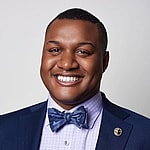The first time I saw a believable Black gay man on television was watching the character of Omar Little, played by the late Michael K. Williams, in The Wire.
I was around 12 years old at the time, and I remember being stunned by the fact that there was a Black gay man who was tough, confident, sexual, funny, and gangsta on a show that straight people were huge fans of. Omar was believable because he wasn’t a stereotype of a hypersexual, overly flamboyant caricature that was often depicted in the media by the likes of Damon Wayans and David Alan Grier on In Living Color.
No, Omar was relatable and complex — he kicked ass, was emotional, and felt raw. It was fascinating to watch, because while the incredible character was queer — his sexuality wasn’t what defined his arc on the show. Before The Wire, so many shows that featured LGBTQIA characters spent more time trying to make a political statement than simply normalizing. I wouldn’t get an opportunity to see other Black gay male characters on TV that gave me as much life until the release of Noah’s Arc a few years later.

I would later be shocked to find out that it was a cisgender-heterosexual actor who gave Omar the depth and sensitivity that so many other entertainers would have never done. Michael K. Williams made a bold career move that continues to be even major now as cis-het Black actors still struggle with with the stigma of playing Black queer roles.
In 1993, superstar Will Smith says that legendary actor Denzel Washington advised him not to kiss another man while playing a gay con-artist in the hit film Six Degrees of Separation to preserve his masculine image. In 2015, Kevin Hart said he turned down a gay role in Tropic Thunder due to his “own personal insecurities.” Other straight Black actors, from Samuel L. Jackson to Mike Epps, have also made it a point to tell the press that they wouldn’t play gay roles either.
But such fears never stopped Williams. Since The Wire, he went on to give humanity to other Black queer characters, such as Black Vietnam veteran Leonard Pine in 2016’s Hap and Leonard, the late HIV-positive activist Ken Jones in 2019’s When We Rise, and estranged father Montrose in 2020’s Lovecraft Country. The latter performance gave the actor his fifth and final Emmy nomination, further solidifying his allyship and compassion for the LGBTQIA community.
“My reasoning for wanting to take this particular role is way more personal than me being afraid of not eating,” Michael K. Williams said in a 2019 interview with Plus Magazine on playing queer characters. “I would have done this for free. It was an honor to tell these stories.”

Since starting his performing career as a professional dancer at the age of 22, Williams was an LGBTQIA ally in his native Brooklyn, New York as the HIV epidemic impacted loved ones around him.
“My nephews, Michale Frederick Williams and Eric Williams, both are deceased. This is my blood,” Williams told Plus Magazine. “They were two gay men that I loved to death. My best friend who taught me the streets in Brooklyn was a lesbian, Robin Henry. She’s still alive. I danced in the house music world, danced background for Crystal Waters.”
What Michael K. Williams has done with many of his roles is redefine the power of Black masculinity in ways I didn’t ever think was possible on screen. He wasn’t afraid to be fully intimate with other men, while also never losing his signature bravado. We saw this undeniable range in the outspoken and humorous Leonard Pine to the very closeted, character study that was Montrose. It was a revelation to witness how his growing fame never stopped him from taking roles that many would have considered career suicide. Starting in 2002 with The Wire’s Omar to 2020’s Lovecraft Country, Williams gave us incredible queer characters to remember for nearly 20 years.
May his legendary career stand as a beacon of inspiration for other Black actors to take similar risks and expand their empathy for the LGBTQIA community.

Ernest Owens is the Editor at Large of Philadelphia magazine and CEO of Ernest Media Empire, LLC. The award-winning journalist has written for The New York Times, NBC News, USA Today and several other major publications. Follow him on Facebook, Twitter, or Instagram and ernestowens.com.
Have you subscribed to theGrio’s “Dear Culture” podcast? Download our newest episodes now!
TheGrio is now on Apple TV, Amazon Fire and Roku. Download theGrio.com today!


